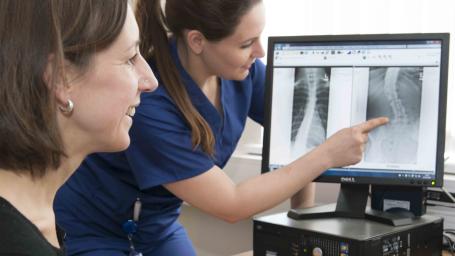RECOVERY (Respiratory Support) is a national clinical trial that has been identified by the Government as an urgent public health priority.
Over 30,000 people are taking part in a range of NIHR-supported COVID-19 research studies across the UK, including RECOVERY (RS).
The study was set up to compare three possible NHS treatments used to control oxygen levels, with the goal being to find out which is most effective at keeping oxygen levels high, and which is best at preventing a patient needing further medical assistance with their breathing.
Here, Dr James Dodd talks further about the RECOVERY (RS) study at North Bristol NHS Trust:
Video Transcript
Hello, my name is James Dodd, I'm a Consultant Respiratory Physician here at Southmead Hospital in Bristol, and I'm the Principal Investigator for the RECOVERY Respiratory Support study.
This is a national clinical trial that's been identified by the Government as being of urgent public health priority.
It's designed to be undertaken in adults admitted to hospital with confirmed or suspected COVID-19, and it's designed to determine what might be the best strategy of improving oxygen levels and helping to prevent patients from deteriorating and requiring more support with their breathing.
It compares three treatments that are already available in the NHS. One is CPAP (Continuous Positive Airway Pressure), whereby an awake patient will have a tight-fitting mask fitted where continuous pressure is applied and delivers oxygen to keep the airways open and clear.
The second is High-Flow Nasal Oxygen, whereby humidified or moistened oxygen is delivered at speed through tubes up the nose to improve oxygen levels. And finally it is to compare the standard treatment of oxygen masks or tubes up the nose.
Nobody's currently clear as to which of these strategies is more effective. This study is designed to answer that question, and the data will be reviewed regularly to identify if there is any treatment that is more effective and can be made available at speed to patients across the NHS.
We have a dedicated team working seven days a week at Southmead Hospital made up of nurses, physiotherapists and doctors working the emergency respiratory and critical care areas to recruit to this important study.
Study Results:
RECOVERY-RS Results
Over 13 months, between April 2020 and May 2021, a total of 1,272 hospitalised COVID-19 patients with acute respiratory failure, aged over the age of 18, were recruited to the study and randomly allocated to receive one of three respiratory support interventions as part of their hospital care.
380 (29.9%) participants received CPAP; 417 (32.8%) participants received HFNO; and 475 (37.3%) received conventional oxygen therapy.
The primary outcomes assessed through the trial were whether the patient went on to require tracheal intubation (invasive mechanical ventilation) or died within 30-days of beginning treatment through the trial.
In the comparison of CPAP and conventional oxygen therapy, the likelihood of patients going on to require invasive mechanical ventilation or die within 30-days of treatment was significantly lower in those who were treated with CPAP, than those who received standard care. In the CPAP group, 137 of 377 participants (36.3%) either needed mechanical ventilation or died within 30 days, compared with 158 of 356 participants (44.4%) in the conventional oxygen therapy group.
There was no difference in primary outcomes between patients in the HFNO and conventional oxygen therapy groups. In the HFNO group, 184 of 414 participants (44.4%) went on to require mechanical ventilation or die, compared with 166 of 368 participants (45.1%) in the conventional oxygen therapy group.
Based on these results, 1 person would avoid needing invasive ventilation within intensive care units (ICU) for every 12 people treated with CPAP instead of standard oxygen therapy.
Dr James Dodd, Respiratory Specialist and Principal Investigator of RECOVERY-RS here at North Bristol NHS Trust said:
“The RECOVERY-RS trial has provided much needed evidence about the most effective ways of supporting some of the most seriously ill patients with COVID-19 requiring additional oxygen. These preliminary data suggests that CPAP, a form of non-invasive respiratory support delivered outside of critical care, can reduce the need for invasive ventilation and reduce the pressure on intensive care beds. It also suggests that high-flow nasal oxygen which uses lots of oxygen did not improve outcomes.
This evidence will help clinicians at North Bristol NHS Trust and across the world caring for patients with severe COVID-19 and respiratory failure. We would like to thank our patients and extended research team working across respiratory medicine, emergency and critical care in delivering this study in the early phases of the pandemic.”
Thank you to all of our research teams who are making such a different to people’s lives, and also to Southmead Hospital Charity which is raising much-needed funds for COVID-19 research.
Take Part in Research

Become one of the thousands of people taking part in research every day within the NHS.
Contact Research
Research & Development
North Bristol NHS Trust
Level 3, Learning & Research building
Southmead Hospital
Westbury-on-Trym
Bristol, BS10 5NB
Telephone: 0117 4149330
Email: research@nbt.nhs.uk

